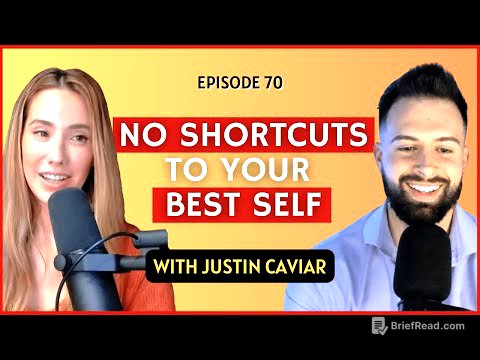TLDR;
Emily Esfahani Smith argues that the pursuit of happiness may not be the most fulfilling path in life. She introduces the concept of meaning, which involves belonging to and serving something beyond oneself, and identifies four pillars of a meaningful life: belonging, purpose, transcendence, and storytelling. She emphasizes that building these pillars can lead to a more resilient, successful, and longer life, and that societies should focus on creating cultures of meaning to help individuals thrive.
- Chasing happiness can lead to unhappiness, while having meaning in life provides resilience and fulfillment.
- The four pillars of a meaningful life are belonging, purpose, transcendence, and storytelling.
- Creating a narrative from life events and focusing on redemption and growth can transform one's life.
The Problem with Chasing Happiness [0:12]
The speaker used to believe that the purpose of life was to pursue happiness, seeking success in career, relationships, and material possessions. However, this pursuit led to feelings of anxiety and aimlessness, a sentiment shared by her friends. Research indicates that chasing happiness can paradoxically make people unhappy. The speaker highlights a concerning trend: despite objective improvements in living standards, suicide rates are rising, and more people feel hopeless and alone, suggesting a deeper emptiness beyond just a lack of happiness.
The Difference Between Happiness and Meaning [1:42]
The speaker questions whether there is more to life than just being happy and explores the distinction between happiness and meaning. Happiness is defined as a state of comfort and ease, feeling good in the moment. Meaning, on the other hand, is a deeper concept that involves belonging to and serving something beyond oneself and developing one's best qualities, as defined by psychologist Martin Seligman. The speaker argues that seeking meaning is a more fulfilling path than simply chasing happiness, citing studies that show people with meaning in life are more resilient, successful, and live longer.
The Four Pillars of a Meaningful Life: Belonging [3:01]
The first pillar of a meaningful life is belonging, which comes from relationships where individuals are valued for who they are intrinsically and where they value others. True belonging springs from love and is a choice to cultivate connections with others. The speaker illustrates this with an anecdote about her friend Jonathan and a newspaper vendor, emphasizing that small acts of kindness and recognition create bonds that uplift individuals. Rejecting others, even in small ways, can devalue them and make them feel invisible, while leading with love fosters a sense of belonging.
The Four Pillars of a Meaningful Life: Purpose [4:42]
The second pillar is purpose, which is less about what you want and more about what you give. Purpose involves using your strengths to serve others, whether through work or other activities. The speaker shares examples of a hospital custodian who sees her purpose as healing sick people and parents who find purpose in raising their children. Issues like disengagement at work and unemployment are not just economic problems but existential ones, as they deprive people of a sense of purpose and something worthwhile to do.
The Four Pillars of a Meaningful Life: Transcendence [5:42]
The third pillar is transcendence, which involves experiencing moments where you feel connected to a higher reality and your sense of self fades away. These transcendent states can come from various sources, such as art, nature, or spiritual practices. The speaker shares personal experiences of transcendence through writing and cites a study where students who looked up at tall trees felt less self-centered and behaved more generously, highlighting the transformative power of these experiences.
The Four Pillars of a Meaningful Life: Storytelling [6:38]
The fourth pillar is storytelling, which involves creating a narrative about your life to bring clarity and understand how you became who you are. The speaker emphasizes that individuals are the authors of their own stories and can change the way they tell them, even within the constraints of facts. She shares the story of Emeka, who was paralyzed playing football and initially told himself a story of loss and despair. However, Emeka later reframed his story as one of redemption and growth, which led him to find purpose in serving others. The psychologist Dan McAdams calls this a "redemptive story," which is common among people leading meaningful lives.
Creating Cultures of Meaning [8:54]
The speaker reflects on her upbringing in a Sufi meetinghouse, where the four pillars of meaning were integral to daily life. She notes that strong communities, both good and bad, often have cultures of meaning that provide people with something to live and die for. Therefore, society must offer better alternatives by building these pillars within families and institutions to help people become their best selves. Living a meaningful life is an ongoing process that requires work and reflection.
The Power of Meaning [10:48]
The speaker shares a personal story about her father's heart attack and how his love for his family gave him the will to live. His sense of belonging, purpose, and transcendent meditation helped him survive. This illustrates the power of meaning in life, which provides something to hold on to during both good and bad times. While happiness comes and goes, meaning sustains individuals through life's challenges.









